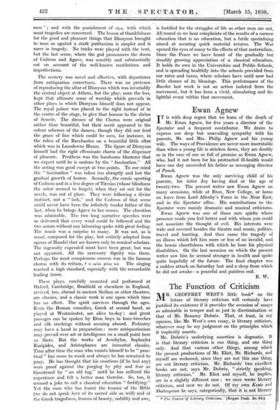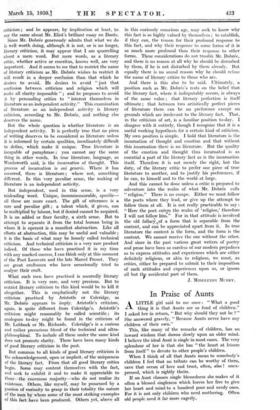The Function of Criticism
MR. GEOFFREY WEST'S little book* on the 1_1 future of literary criticism will certainly have justified its existence if it provides the occasion of essays so admirable in temper and so just in discrimination as that of Mr. •Bonamy Dobree. That, at least, in my opinion, like Mr. West's own essay, is literary criticism, whatever may be my judgment- on the principles which it implicitly asserts.
Mr. Dobree's underlying assertion is dogmatic. It is that literary criticism is one thing, and one thing only. And that various other things, among which the present productions of Mr. Eliot, Mr. Richards, and myself are reckoned, since they are not this one thing, are not literary criticism. Mr. Richards' two . excellent books are not, says Mr. Dobree, "strictly speaking, literary criticism." .Mr. Eliot and myself, he implies, are in a slightly different ease we once wrote literary criticism, and now we do not. Of my own Keats and Shakespeare he, says,'.categorically, that it is not literary * The Future-of Litekiry Criticism. (liegati Paul-. 2s. Ott.) criticism ; and he appears, by implication at least, to say the same about Mr.. Eliot's brilliant essay on Dante.
Since Mr. Dobree generously admits that what we do is well worth doing, although. it is not, or is no longer, literary criticism, it may appear that I am quarrelling about a mere. word. But mere words, as a literary critic, whether active or emeritus, knows well, are very important. And it seems to me that to restrict the name of literary criticism as Mr. Dobree wishes to restrict it will result in a deeper confusion than that which he desires to avoid.. He desires to avoid ." just that confusion between criticism and religion which, will make all clarity impossible " ; and he proposes to avoid it by persuading critics to " interest themselves in literature as an independent activity." This examination of literature as an independent activity is literary criticism, according to Mr. Dobree, and nothing else deserves the name.
But the whole question is whether literature is an independent activity. It is perfectly true that no piece. of writing deserves to be considered as literature unless it is. informed by certain qualities, inordinately difficult to define, which make it unique. True literature is incapable of paraphrase ; you cannot say the same thing in other words. In true literature, language, as Wordsworth said, is the incarnation of thought. This process of incarnation is sui generic. Where it has occurred, there is literature ; where not, something different. .In this very peculiar sense, the making of literature is an independent activity.
But independent, used in this sense, is a very misleading word. Unique, incommensurable, specific— all these are more exact. The gift of utterance is a rare and peculiar gift ; a talent which, if given, can be multiplied by labour, but if denied cannot be acquired. It is an added or finer faculty, a sixth sense. But to attempt to separate it from the total human being in whom it is operant is a manifest abstraction. Like all efforts at abstraction, this may be useful and valuable ; it is the 'basis of what may be loosely called technical criticism. And technical criticism is a very rare product indeed. Of those who have practised it in my time with any marked success, I can think only at this moment of the Poet Laureate and the late Marcel Proust. They are great craftsmen who have occasionally tried to analyse their craft.
What such men have practised is assuredly literary criticism. It is very rare, and very precious. But to restrict literary criticism to this kind would be to kill it altogether. This is emphatically not the literary criticism practised by Aristotle or Coleridge, as Mr. Dobree• appears to imply. Aristotle's criticism, again, is 'quite different from Coleridge's. Aristotle's criticism might reasonably be called scientific ; its analogues to-day might be found in the criticism of Mr. Lubbock or Mr. Richards. Coleridge's is a curious and rather precarious blend of the technical and ultra- philosophical. To include all these under the same kind does not promote clarity. There have been many kinds of good literary criticism in the past.
But common to all kinds of good literary criticism is the acknowledgement, open or implicit, of the uniqueness of the literary fdet. From that all good literary critics begin. Some may content themselves with the fact, and seek to exhibit it and to make it appreciable to those--the enormous majority—who do not realize its existence. Others, like myself, may be possessed by a passion of curiosity to grasp in' their totality the nature of the men by whom some of the most striking examples of this fact have been produced. Others yet, above all in this curiously conscious age, may seek to know why this fact is so highly valued by themselves ; to establish, if they can, the reason for their profound response to this fact, and why their response to some forms of it is so much more profound than their response to other" forms. These considerations do not trouble Mr. Dobree, and there is no reason at all why he should be disturbed by them, if he is not disturbed by them already. But equally there is no sound reason why he Should refuse the name of literary critics to those who are.
And there is this also to be said. Ultimately, a position such as Mr. Dobree's rests on the belief that the literary fact, where it indisputably occurs, is always of the same value ; that literary perfection is itself ultimate ; that between two artistically perfect pieces. of literature there can be no preference except on grounds which are irrelevant to the literary fact. That, in the criticism of art, is a familiar position to-day. I disagree with it entirely, though I recognize that it is a useful working hypothesis for a certain kind of criticism. My own position is simple. I hold that literature is the incarnation of thought and emotion and that without this incarnation there is no literature. But the quality of the emotion and thought thus incarnated is as essential a part of the literary fact as is the incarnation itself. Therefore it is not merely the right, but the duty, of the literary critic to prefer one piece of true literature to another, and to justify his preferences, if he can, to himself and to the world at large.
And this cannot be done unless a critic is prepared to adventure into the realm of what Mr. Dobree calls " religion." There is no escape. Either we must follow the poets where they lead, or give up the attempt to follow them at all. It is not really practicable to say : " Here the poet enters the realm of 'religion,' therefore I will not follow him." For in that attitude is involved the old fallacof a form that is separable from the content, and can be appreciated apart from it. In true literature the content is the form, and the form is the content. We cannot receive the one without the other. And since in the past various great writers of poetry and prose have been so careless of our modein prejudices as to express attitudes and experiences which are either definitely religious, or akin to religious, we must, as critics, either be prepared to submit to their imposition of such attitudes and experiences upon us, or ignore all but tly accidental part of them. J. MIDDLETON MURRY.





















































 Previous page
Previous page